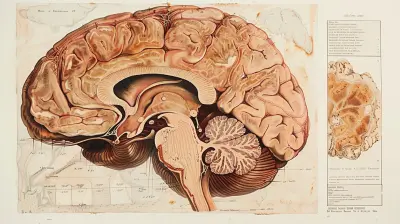15 March 2025
Have you ever looked back at your younger self and wondered, "Wow, was that really me?" Maybe you were more shy, more outgoing, or just seemed like a completely different person. This raises an interesting question: can our personalities actually change over time? Or are we born with certain traits that stick with us throughout our lives, like the color of our eyes or the shape of our noses?
The idea of personality change is something that's intrigued psychologists for decades. Some believe our core traits are set in stone by the time we hit our teenage years, while others argue that we can evolve significantly as we age. Let’s dive into the science behind personality and explore whether we can truly change who we are over time.

What Exactly is Personality?
Before we get into whether personality changes, it’s helpful to know what it actually is. In psychology, personality is a collection of thoughts, feelings, and behaviors that make each person unique. It’s what makes you you and me me.Think of personality like a toolkit. It’s made up of various traits, like how sociable you are, how organized you are, or how you handle stress. Each of these traits helps you navigate life. Some people are naturally more extroverted, while others are more introverted. Some are more detail-oriented, while others are more go-with-the-flow. These traits create a consistent pattern of behavior, which is why people can often predict how you’ll react in certain situations.
The Big Five Personality Traits
Psychologists have boiled personality down to five major traits, often referred to as the "Big Five":1. Openness to Experience – How much you enjoy new experiences or ideas.
2. Conscientiousness – How organized and dependable you are.
3. Extraversion – How outgoing or energetic you are.
4. Agreeableness – How cooperative and compassionate you are.
5. Neuroticism – How prone you are to emotional instability or stress.
Most personality tests, including the famous Myers-Briggs Type Indicator (MBTI), are built on these traits. They help give us a snapshot of our personality at a given time. But, is that snapshot fixed, or can it evolve?

The Nature vs. Nurture Debate
Ah, the age-old debate: nature versus nurture. When it comes to personality, both sides have something to say.Nature: Born This Way?
Some psychologists argue that our personalities are largely influenced by genetics. In other words, you're born with a certain set of traits, and while they might shift slightly over time, the core of who you are remains the same.Think about identical twins raised in different environments. Even though their surroundings might differ, research shows that they often have remarkably similar personalities. This suggests that genetics play a significant role in shaping who we are.
Nurture: Life Changes Us
On the flip side, life experiences can have a huge impact on personality. Major life events—like starting a new job, getting married, or experiencing trauma—can shift how we view the world and, in turn, how we behave.For example, someone who was once carefree and laid-back might become more serious and cautious after becoming a parent. Or someone who was shy in high school might become more outgoing after years of working in a social job. These changes could suggest that personality isn’t as fixed as we once thought.

Can Personality Change? The Science Says Yes (and No)
So, what does research say? Can personality actually change over time? The answer is both yes and no. Let's break it down.Stability vs. Change
According to research, personality is relatively stable, but that doesn't mean it's set in stone. Psychologist Robert McCrae, one of the key figures behind the Big Five theory, suggests that while our basic personality traits remain consistent, they can evolve in response to life experiences.Studies show that personality tends to be more stable during adulthood than in adolescence. However, even in adulthood, subtle shifts can occur. For example, people often become more conscientious and agreeable as they age, perhaps due to increased responsibilities or life experiences that promote empathy.
The "Maturity Principle"
Interestingly, some psychologists argue that personality changes in predictable ways as we get older. This is called the "maturity principle." As people age, they tend to become more agreeable, conscientious, and emotionally stable. In other words, we might mellow out a bit as we navigate the ups and downs of life.This makes sense when you think about it. As we age, we gain more life experience, and that experience teaches us how to better manage relationships, handle stress, and regulate our emotions. While we might not completely transform into a different person, our personality can "mature" in a way that reflects our growth.
Is Changing Your Personality a Good Thing?
But here’s the million-dollar question: even if you can change your personality, should you?Some people may feel like their current personality traits are holding them back. Maybe you're an introvert who wishes you were more outgoing, or perhaps you're highly neurotic and wish you could relax a little more. The good news? While changing your personality isn’t easy, it’s not impossible.
One study conducted by psychologists at the University of Illinois found that people who actively tried to change specific traits, like becoming more extroverted or conscientious, were able to make small but significant shifts over time. The key, however, is consistency. Much like building a muscle, changing your personality requires repeated effort and practice.

Factors That Influence Personality Change
So, what drives personality change? Is it just a roll of the dice, or are there specific factors that can influence how we evolve over time? Let’s take a look at some of the key drivers.1. Life Experiences
From moving to a new city to starting a new relationship, life events can trigger significant shifts in personality. Big transitions often force us out of our comfort zones, which can lead to personal growth. For instance, someone who struggles with anxiety might become more resilient after dealing with a stressful event like job loss or illness.






Loretta Hurst
Insightful! Personal growth is fascinating.
April 1, 2025 at 3:07 AM